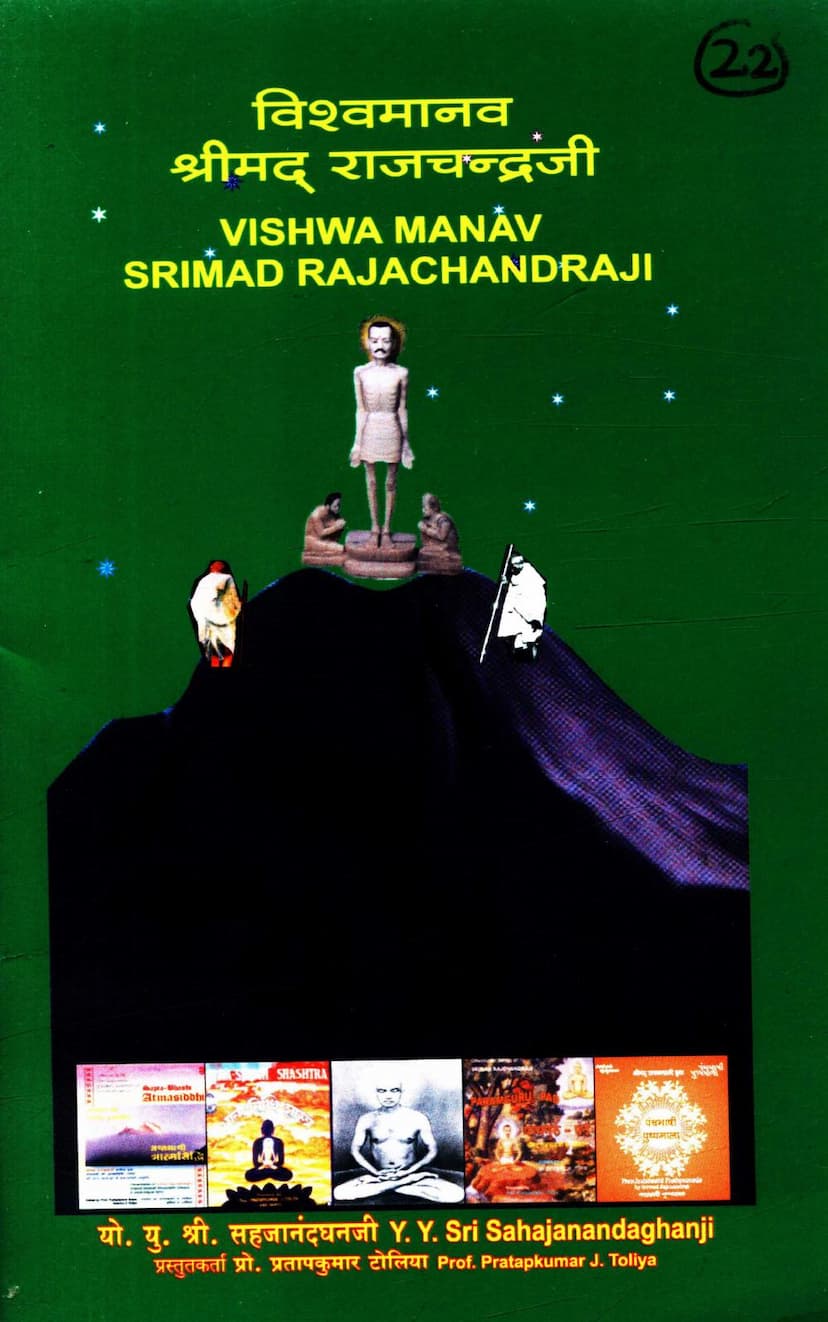Vishva Manav Shrimad Rajchandraji
Added to library: September 2, 2025

Summary
Here's a comprehensive summary of the Jain text "Vishva Manav Shrimad Rajchandraji," authored by Pratap J. Tolia and published by Jina Bharati, based on the provided pages:
The book "Vishva Manav Shrimad Rajchandraji" (Universal Man Shrimad Rajchandraji) aims to introduce the spiritual and cultural contributions of Shrimad Rajchandraji to a modern audience seeking self-realization and world peace. The book highlights him as a significant seer of the modern age, whose profound teachings are particularly relevant amidst contemporary violence, stress, and restlessness.
The work is presented by Y.Y. Sri Sahajanandaghanji Maharaj, a prominent Jain monk who renounced the world at 19. After extensive study of Jain and non-Jain scriptures, and a deep understanding of Shrimad Rajchandraji's literature, he claims to have experienced past-life connections with Rajchandraji and other great souls. He emphasizes that Shrimad Rajchandraji's instruction was to belong to the Self, not to any sect or ideology, leading Sahajanandaghanji to further periods of solitary contemplation.
Key Themes and Aspects of Shrimad Rajchandraji's Life and Teachings:
- Spiritual Guide to Mahatma Gandhi: The book strongly emphasizes Shrimad Rajchandraji's role as Mahatma Gandhi's spiritual guide. Gandhi himself acknowledged Rajchandraji's immense influence in his autobiography, "The Story of My Experiments with Truth." Gandhi described him as a man of great character, learning, and a "Shatavadhani" (one who can simultaneously remember one hundred things). Gandhi sought his guidance during spiritual crises and considered him a refuge, placing him even higher than Tolstoy and Ruskin.
- Foundation of Hinduism: When Gandhi's faith was wavering in South Africa due to external influences, it was Shrimad Rajchandraji who provided him with works like the Bhagavad Gita and Yogavasistha to strengthen his own Hindu faith, rather than pushing Jain scriptures. This demonstrates Rajchandraji's profound respect for all religions and his commitment to spiritual truth over sectarian affiliation.
- Emphasis on Ahimsa (Non-Violence) and Anekant (Many-Sidedness): Jainism's core principles of Ahimsa and Anekant are presented as the crucial solutions to the world's current chaos, violence, hatred, and terrorism. Shrimad Rajchandraji is portrayed as a practitioner and proponent of these principles, embodying them in his life.
- Ideal for Youngsters: The book positions Shrimad Rajchandraji as an ideal role model for young people, highlighting his intellectual brilliance, moral earnestness, and unwavering passion for self-realization.
- Extraordinary Childhood and Intellect: The text recounts several remarkable incidents from Shrimad Rajchandraji's childhood that illustrate his exceptional intellect and spiritual depth.
- Early Religious Impressions: While his grandfather was a devotee of Lord Krishna, his mother instilled Jain cultural values. Rajchandraji experienced early inclinations towards spiritual life, even as he also experienced worldly desires.
- Exceptional Memory and Learning: From a young age, he demonstrated an astonishing ability to grasp and retain information, impressing his teachers. He mastered complex texts quickly.
- Intellectual Prowess: As a child, he participated in intellectual discussions among learned adults, offering profound insights that astonished them. He demonstrated mastery of the complex "Syadvada" (Jain logic) from a tender age.
- Avadhanas and Shatavadhanas: He possessed extraordinary memory and concentration skills, capable of performing "Avadhanas" (simultaneously attending to multiple intellectual tasks) and even "Shatavadhanas" (one hundred such tasks). He showcased these abilities publicly, earning titles like "Jewel of India."
- "Jati-Smriti-Jnana" (Knowledge of Past Lives): At the age of seven, after witnessing a cremation, he experienced a profound awakening, leading to the realization of his past lives and his true spiritual nature. This event marked a significant turning point in his life, demonstrating his innate spiritual understanding.
- Divine Foresight: He displayed precognitive abilities, such as knowing when visitors were arriving and arranging for their accommodation before they even arrived.
- Saving a Judge: He alerted a judge, Dharshibhai, to a conspiracy against his life orchestrated by his maternal uncles, demonstrating both his sharp intellect and his compassionate nature.
- Self-Realization as the Ultimate Goal: The central theme is Shrimad Rajchandraji's lifelong pursuit of Self-realization. Gandhi noted that "this last was the only thing for which he lived." This passion drove all his actions and teachings.
- Rejection of Fame and Publicity: Despite his extraordinary abilities, Shrimad Rajchandraji actively avoided fame and publicity, even declining an invitation from the Viceroy of India. He viewed honor and fame as obstacles to spiritual progress and ego inflation.
- Balanced Life: He managed his worldly obligations through a jewelry business in Mumbai while dedicating his inner life to spiritual practice, often in seclusion in places like Idar. He is described as a "Mahayogi" even within his householder life.
- Literary Contributions: He authored significant works such as "Mokshamala" and "Sri Atmasiddhi Shastra," which expound profound spiritual knowledge and the essence of self-realization. "Atmasiddhi Shastra" is considered a jewel of world literature and the gist of Indian philosophy.
- Legacy and Propagation: The book highlights the ongoing efforts to propagate Shrimad Rajchandraji's teachings, including the translation of "Atmasiddhi Shastra" into multiple languages and various media productions like radio plays and CDs. The work itself is part of these propagation efforts, marking the 150th birth anniversary of Shrimad Rajchandraji.
In essence, "Vishva Manav Shrimad Rajchandraji" presents Shrimad Rajchandraji as a universal soul, a guiding light for modern humanity, particularly for the youth. His life exemplifies the Jain principles of Ahimsa and Anekant, his intellectual brilliance is unparalleled, and his unwavering focus on Self-realization serves as an enduring inspiration, profoundly influencing not only his direct disciples like Mahatma Gandhi but also the spiritual landscape of India and beyond.